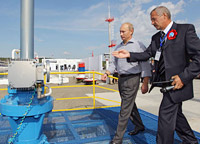Less than a year after signing a multi-billion-dollar energy and trade agreement with China , Russian prime minister Vladimir Putin has inaugurated the Russian branch of a pipeline to supply oil to China .
On 29 August Russian prime minister Vladimir Putin launched opened an 84-km section of a crude oil pipeline spur running from Skovorodino in Eastern Siberia to the Amu River/Heilongjiang River crossing point on the border between Russia and China. The official ceremony took place in Skovorodino, in Russia ’s far eastern Amur region, and was also attended by the director of China ’s National Energy Administration, Zhang Guobao, as well as officials from China ‘s National Development and Reform Commission (NDRC) and the China National Petroleum Corp. (CNPC), involved in the project. The newly launched branch is part of the Eastern Siberia-Pacific Ocean (ESPO) pipeline that Transneft— Russia ’s state pipeline-operating monopoly—built after reaching an agreement with China ’s largest state-owned energy company, CNPC. At the end of the opening ceremony Putin added that he was confident that the Chinese section of the pipeline would be completed in a few months, enabling the delivery of Russian oil to China by the end of the year.
The launch of the Russian section of the pipeline has been long awaited by both parties. Putin has been instrumental in promoting energy and wider business with its eastern neighbour despite their troubled relationship in the past. During his visit to China in October 2009, Putin sealed some 40 trade deals worth remarkable US$3.5 billion with Chinese president Hu Jintao and his counterpart Wen Jiabao (see China – Russia: 14 October 2009: China and Russia Finalise Multi-Billion-Dollar Ten-Year Trade Deals). The centrepiece of this trade is energy co-operation. Russia agreed on a 20-year deal for oil supplies to China in return for US$25 billion in credit for Transneft and Russian state oil company Rosneft. The 4,000-km ESPO is set to run from Taishet in eastern Siberia to Nakhodka, in Russia ’s far east, while the Russia-China branch of ESPO is to run from Skovorodino to China ‘s north-eastern city of Daqing . The Russian government has indicated that China will initially receive 30 million tonnes of oil, which is likely to increase to 50 million tonnes annually.
Outlook and Implications
The new pipeline is like to become fully functional by the beginning of 2011. Besides brining Russian oil to China , it is sure to shape the bilateral ties of the two countries. The oil deliveries are likely to give a new impetus to a stalled and much larger gas deal that has been in the making since 2006 but has not been concluded because of disagreements over price formulae. Currently China imports no gas from Russian state-run gas giant Gazprom, but now it is hoped deliveries will commence in 2014–15, reaching China either by new pipelines or in liquefied natural gas form aboard tankers. The pricing formula still needs to be agreed; Russia would like it to mimic those of Europe , which peg the price of gas to that of crude oil. China ’s ever-growing hunger for hydrocarbons is certainly one of the drivers behind the construction of the pipeline. Nonetheless, the Russian government also has vested interests in expansion of the ESPO into China . It is keen to diversify its energy export routes and perhaps redirect some of the 120–130 million tonnes per year of oil shipments that are currently bound for Europe to the Asia-Pacific region instead. The diversification will benefit Russia for number of reasons, including cutting cost of transportation since China is closer to Siberian oilfields. It will also help Russia avoid its problematic neighbours to the west—namely Belarus and Ukraine —that have repeatedly caused problems for western-bound transit of Russian oil and gas shipments. The new pipeline is an important step to facilitate growth of Russian-Chinese energy co-operation, which is set to reach US$60 billion by the end of 2010. It also highlights the uneven nature of the bilateral economic ties, where some Russian critics have voiced their disapproval that the government is selling the country’s natural resources to China, a country that is hard to bargain with on price and reluctant to transfer new technologies to Russia.
IHS Global Insight Limited
United Kingdom

